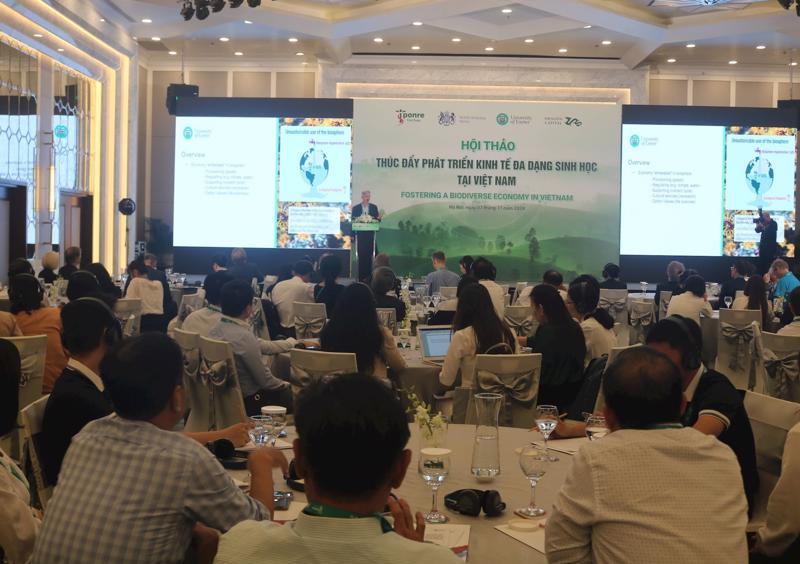In recent times, biodiversity has become a global issue, playing an important role in the socio-economic development of each country, helping to limit the impacts of climate change, and providing better livelihoods for local communities.
The 16th meeting of the Conference of the Parties to the Convention on Biological Diversity (CBD COP16), held between October 21– November 1, has produced positive results. In particular, the meeting adopted a new mechanism and fund for fair and equitable sharing of benefits from the use of digital sequencing information on genetic resources, including a global fund (the Multilateral Mechanism). This will help ensure that those who benefit from biodiversity give back to communities, countries and, most importantly, to nature.
Nature provides livelihoods and a source of life for billions of people around the world. Therefore, conserving nature will play a vital role in common efforts for sustainable development future.
In this context, the Institute of Strategy and Policy on Natural resources and Environment (ISPONRE) under the Ministry of Natural Resources and Environment, the British Embassy in Vietnam, the University of Exeter, and Dragon Capital Vietnam jointly organized the seminar “Fostering a Biodiverse Economy in Vietnam” to explore solutions to challenges arising from balancing economic development with the conservation of natural ecosystems.
Biodiversity degradation in Vietnam
At the seminar, Prof. Ben Groom, Head of the Dragon Capital Biodiversity Economics Research at the University of Exeter of the UK, said that the economy is fundamentally linked to nature, but this relationship is not fully reflected in economic indicators such as GDP. This leads to an underestimation of nature's contribution and billions of dollars wasted each year on environmental destruction.
Therefore, an independent assessment report on the economics of biodiversity, conducted by Prof. Sir Partha Dasgupta, University of Cambridge, emphasized the urgent need to change the way biodiversity is valued and managed. Besides, the author recommends that countries need to value nature, conduct cost-benefit analysis for public investments and value natural capital to assess the sustainability of the economy.
According to the 2024 World Population Review rankings, Vietnam ranks 14th globally and is among the top three Southeast Asian countries in terms of biodiversity richness. However, the country is facing rapid ecosystem degradation due to pressures from socio-economic development, population growth, unsustainable land use practices, natural resource exploitation, environmental pollution, and the impacts of global climate change.
These issues pose significant challenges to both the environment and local communities, many of whom rely on ecosystems for their livelihoods.
Sharing at the seminar, Mr. Nguyen Dinh Tho, Director General of ISPONRE remarked that Vietnam is one of the 12 biodiversity centers with rich and diverse rare and valuable genetic resources worldwide.
Over the years, biodiversity has made great contributions to the national economy, providing the basis for ensuring food security; maintaining genetic resources for livestock and crops; providing construction materials and fuel and medicinal resources; and being the foundation for developing the agricultural, forestry, fishery and tourism sectors.
However, like many other countries, Vietnam is currently facing many challenges when conserving biodiversity, which is closely related to economic development and social stability.
In fact, Vietnam is facing an increasingly serious biodiversity loss due to the impacts of land conversion, infrastructure development, invasive alien species, overexploitation of resources, environmental pollution, and pressure from rapid population growth...
Mr. Marcus Winsley, Deputy Head of Mission, the British Embassy Hanoi, also highlighted Vietnam's potential to achieve both economic and biodiversity goals. It is a rapidly developing country and one of the world’s richest biodiversity centers.
In particular, mangroves, forests, tidal flats and lagoons are the most prominent and valuable ecosystems in Vietnam. However, these ecosystems are facing increasing pressure from climate change and unsustainable economic development.
Developing financing mechanisms, maitaining connections and mobilizing resources
Faced with the current situation of biodiversity development, Mr. Tho said that the Vietnamese Government has made specific commitments to promoting biodiversity conservation, ensuring harmonious balance between economic development and biodiversity conservation.
The Vietnamese Government always emphasizes the importance of combining development and conservation of natural ecosystems. At the COP26, Prime Minister Pham Minh Chinh emphasized: "Responding to climate change and restoring nature must become the highest priority in all development policies."
Vietnam has also issued policies and laws on biodiversity conservation, such as the Law on Biodiversity 2008, Decision No. 149/QD-TTg of the Prime Minister approving the National Strategy on Biodiversity to 2030, vision to 2050, which emphasizes the need to develop innovative financial mechanisms to support biodiversity conservation efforts.
By proactively participating in international conventions, together with the efforts of ministries, branches and localities, Vietnam has been gradually preventing biodiversity from declining, aiming towards effective conservation of nature and restoration of ecosystems.
However, Mr. Tho noted that to promote sustainable development of the biodiversity economy, it is important to maintain connectivity and mobilize resources.
Appreciating Vietnam's efforts in promoting sustainable development of the biodiversity economy, Mr. Winsley confirmed that the United Kingdom will continue supporting Vietnam in its journey to build a sustainable economy.
According to Prof. Lisa Roberts, President and Vice-Chancellor of the University of Exeter, conserving natural resources is not only the "key" to contributing to minimizing the negative impacts of climate change, but also ensuring sustainable green economic development.
In the coming time, by combining the expertise of the University of Exeter in biodiversity economics with its partners, Vietnam can propose solutions to protect both the environment and promote economic growth.
Meanwhile, Mr. Dominic Scriven OBE, Chairman of Dragon Capital Vietnam emphasised that the private economic sector plays an important role in protecting Vietnam's biodiversity. "Therefore, we have been cooperating with the ISPONRE to research and propose financial mechanisms that are in line with the Government's orientation as well as the country's overall goals," he added.









 Google translate
Google translate